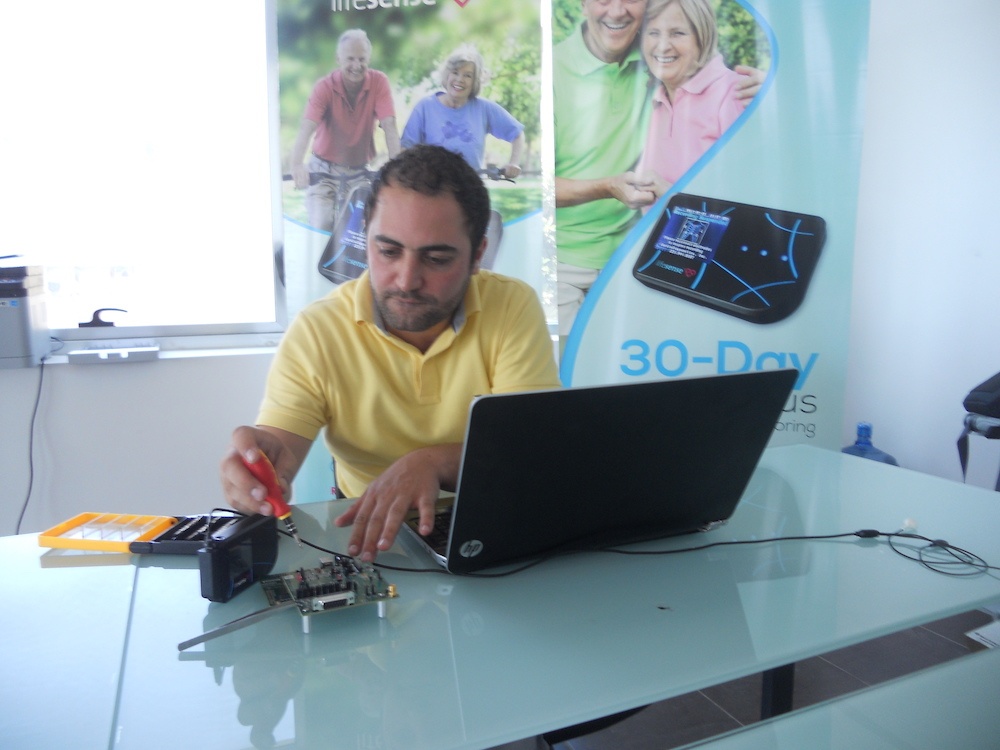Pushing patents in Lebanon

For many innovators, a patent is a stamp of approval, a sign that a concept has passed the test of originality and viability. In Lebanon, however, entrepreneurs often skip registering intellectual property locally and instead go directly to the global market in search of more sophisticated company protection.
“For the time being, registering intellectual property in Lebanon is a very simplistic process. You just go to the Ministry of Economy, submit a form, explain your innovation, and get a receipt. It doesn’t go through an investigation the way it does in developed countries,” said Ziad Sankari, founder and CEO of Cardiodiagnostics, a heart-monitoring system founded in Lebanon but registered in the United States.

Although some Lebanese innovators do register their patents locally, as an initial step to show potential customers and investors the seriousness of their business, those who do it tend to see it as more symbolic than a strong legal protection. Among the reasons Lebanese entrepreneurs often focus on foreign patents include: better evaluation systems, better legal protection and better credibility in the West.
Sankari has concluded that registering locally is pointless. “I wouldn’t register my own intellectual property in Lebanon,” he said. “I’d register in foreign markets. We’re very primitive. We need a lot of work.” This is a widely shared sentiment in the country, where talent is abundant but the resources for protecting it are lacking.
Walid Hanna, founding partner at the VC firm Middle East Venture Partners, agreed that a patent registered in Lebanon carries little weight; he does not even entertain the notion of registering locally when making investment decisions. Similarly, Fouad Fattal, who invented a device that allows an iPhone to carry an extra SIM card, chose to register his intellectual property abroad.
Even though it took several years, multiple attempts, and much more money than in Lebanon, he believes it was worth it.
Explaining his decision, Fattal said: “Here, you don’t feel like you’re legally protected. It has to come from a place where patents are valued and protected. This is what can secure an exit. We filed for our patent in the UK.”
Reversing Lebanon’s low rate of patent registration is an uphill battle for Lebanese businesses and the government, both of which would like to see the country recognized for its innovation.
Other countries in the region have made progress in recent years, with the GCC having promulgated a unified patent law in 1992, although the six GCC countries still see few annual patent registrations compared with developed countries.
Many factors work to dissuade many Lebanese innovators from registering their intellectual property in their own country - an insufficient budget and a shortage of expertise when it comes to patent inspection; a small consumer market; a lack of awareness and international support. To make matters worse, although Lebanon is a member of the World Intellectual Property Organization (a UN body that helps protect intellectual property across borders), it remains one of the very few countries not party to WIPO’s Patent Cooperation Treaty, which 152 states have signed.
The result is scant awareness of the importance and nuances of intellectual property rights among many of Lebanon’s most talented innovators, part of a vicious cycle characterized by lack of faith in a system that in turn doesn’t have the inclination to invest the necessary resources in protecting Lebanese innovations. As Lebanon’s patents go abroad, so does much of its talent.
“We’re not in the position to say if a patent is valid or not,” lamented Wissam El Amil, head of the intellectual property unit at the Ministry of Economy and Trade, where around 350 to 400 patents are registered per year. “It’s always been this way for Lebanon. We don’t have great options. It’s better to have an examination system to know if an invention can be patented or not,” he maintained, pointing to the difficulties Lebanese innovators face when they want to protect their creation in their home country.
On a more encouraging note, El Amil pointed out that there’s a good chance the Lebanese government will soon adhere to WIPO’s aforementioned Patent Cooperation Treaty, seeing it as a good way for a Lebanese inventor to apply for a patent registration abroad in a less costly manner.
However, it’s up to the Lebanese parliament to pass the legislation. El Amil hopes to see it passed this year, along with other legislations designed to protect and support intellectual property. He would also like to see coordination between Lebanese and Western patent authorities to help fill the gaps in intellectual property evaluation. For now, the ministry is working on a new automation project and an intellectual property automation system, with the resulting database made available online. It is also working with NGOs and holding sessions with Lebanese entrepreneurs to understand what kind of support they need for their products and businesses.
Meanwhile, at the American University of Beirut, administrators are taking steps to raise awareness of the importance of patent registration.

Since the Ministry of Economy and Trade doesn’t have the resources to fully evaluate intellectual property, the university has assigned itself the role of innovation gatekeeper, enabling the faculty to enter all the relevant details concerning their innovations into a database. Once an innovation is patentable, the AUB will prepare all of the documents through its US law office. The next step is for the office to apply for a provisional 12-month patent, giving the innovator a year to try to sell the idea to companies.
“With this awareness-raising, faculty members will be guided in the process of patenting,” said May Ammar, associate director of the technology transfer unit at AUB. “We don’t promise the moon. We’re very transparent. Research is not a dead end. It can lead to innovation. It can be a bridge to break through to use for business development.”
It’s a heartening sign of progress, but the fact remains that until Lebanon can provide reliable intellectual property assessments to its innovators, entrepreneurs will have to make do with the limited resources at their disposal.
“We’re not mature enough to understand the value of a patent,” claimed Fattal, referring to Lebanon’s patent registration system. “We need our politicians. We’re trying to create a bridge between what we need. Government support starts with the basic rules.”
Feature image via Stockvault.


